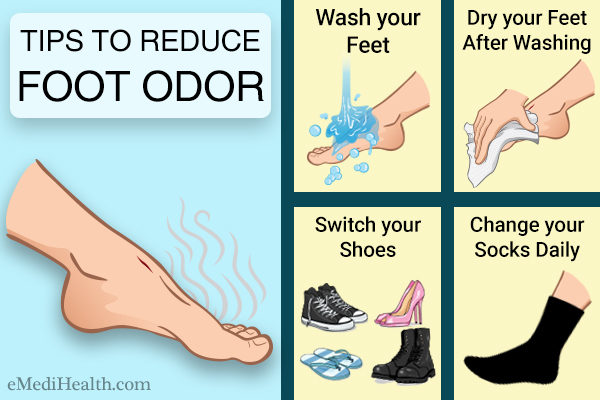How to Get Rid of Foot Odor
Written by Jessica Lal on March 1, 2023
While foot odor may be an annoying and embarrassing problem, it may sometimes be a symptom of a more serious problem. People who have a tendency to perspire profusely are usually the most affected. In fact, smelly feet are often associated with sweaty feet
When perspiration from your feet gets trapped within the confines of your socks and shoes, naturally occurring bacteria that reside on your feet and inside the shoes or socks get a shot of life from the moist environment.
Common bacteria associated with body odor are Staphylococcus hominus, Corynebacteria, and Brevibacteria. If you are dealing with this condition, the first thing to try is to practice good foot hygiene.
It would be wrong to assume that the problem of foot odor is limited to the summer months. In fact, people with smelly and sweaty feet are likely to struggle with this issue all year round.
Causes of Foot Odor
Foot odor primarily stems from poor ventilation of the feet. People who wear closed-toed shoes without socks for prolonged periods on a regular basis are more prone to this problem because their feet do not get enough room to breathe.
There is very little air circulation within the enclosed environment of such footwear, which does not allow the sweat from your feet to evaporate. Given that there are thousands of sweat glands in the feet, layers of perspiration accumulate day by day.
The sweat-induced humidity allows the bacteria on your feet to proliferate. These bacteria break down carbohydrates, fatty acids, and peptides into smaller acids, mainly to produce acetic acid. The by-products of bacteria are characterized by a strong odor, which causes your feet to stink.
Besides perspiration and bacterial activity, foot odor can also emanate from fungal growth on increasingly sweaty feet. This is usually observed in the case of athlete’s foot (tinea pedis).
The following factors also contribute to sweaty and smelly feet:
- Not washing your feet every day
- Repeating the same pair of shoes for several days at a stretch
- Wearing shoes that may be too tight for your feet
- Wearing shoes that are made of “unbreathable” material such as plastic
- Stress, which can cause your feet to sweat more than usual
- Certain hormonal changes in the body, especially during adolescence and pregnancy
- Zinc deficiency
Treatment for Foot Odor
Foot odor is generally a benign condition that can easily be managed or treated through proper foot hygiene measures. Keeping your feet clean and devoid of sweat is essential.
To that end, your doctor may recommend an appropriate antibacterial soap or a mild antiseptic solution to wash your feet with every day for about a week.
It is important to remove all traces of moisture from your feet before you put on socks or shoes. So, once you have washed your feet, give them time to air dry or wipe them with a clean towel. Keeping your feet dry helps to thwart the growth of bacteria on the feet.
People who are prone to excessive sweating may be advised to apply an antiperspirant spray or foot powder on their feet.
- Antiperspirants that contain aluminum chloride are applied to the undersurface of your foot to reduce the activity of the sweat glands located in the soles of your feet.
- The mechanism behind antiperspirants is that when you begin to perspire, the product interacts with the moisture to get absorbed into the skin and ends up plugging the sweat glands. The blocking of the sweat glands is then taken as a cue by the body to halt the production of excessive sweat.
- An alternative that might be helpful would be applying rubbing alcohol to the soles of your feet, preferably after taking a bath or shower. Always make sure that your feet are completely dry before you apply the rubbing alcohol. Simply dip cotton wool in the solution and dab it between your toes. It may be prudent to test the rubbing alcohol on a small area of skin before applying to rule out any skin irritation or adverse reaction.
- Other possible treatments include galvanic foot baths or botulinum toxin injections. Anticholinergic medications taken orally or applied topically may help. Surgical treatment (lumbar sympathectomy) can be considered as a last resort.
Diagnosing Foot Odor
Diagnosis is usually made clinically by history and physical observation. Diagnostic testing is rarely performed. However, since excessive sweating may indicate a more serious underlying problem, diagnostic testing for the potential underlying problem may be undertaken.
Home Remedies and Simple Ways to Reduce Foot Odor
If you have sweaty and smelly feet, you can try the following tips and home remedies to curb the intensity of foot odor.
1. Self-care tips
The following measures can help you manage smelly feet:

- Keep your feet clean by washing them every day with soap and water. Occasionally, you will have to treat your feet to a more rigorous cleansing ritual to remove adherent dirt and debris. Daily bathing does not ensure the cleanliness of your feet as it requires more than just rinsing them under running water. Because you spend most of your time up and about, your feet tend to collect a lot of dirt and debris that needs to be scrubbed off on a regular basis. A foot soak can help loosen the stubborn layer of dirt and dead cells settled on your feet, which can then be easily exfoliated.
- Drying your feet after washing is just as important as the cleansing routine. Damp feet are a breeding ground for bacteria and disease. So, it is very important that you air-dry your feet, especially the space between your toes after washing. A light powder may be applied thereafter to absorb any remaining moisture.
- Another essential step for proper foot hygiene is to wear fresh, clean, and dry socks every day. In fact, people who perspire a lot should go a step further and change their socks more than once daily. It is recommended to keep an extra pair handy when you venture out of the house for a long period.
- When you go shopping for socks, look for those that are made of natural, skin-friendly fabrics that soak up the sweat while allowing your feet to breathe. Cotton or wool socks may seem like the best bet for this purpose, this is not necessarily so. While cotton helps absorb the sweat from the feet, it does not wick it away from the skin, which can cause your feet to blister. Instead, opt for certain acrylic fiber varieties, synthetic blends, and special knits that are designed to wick the moisture away from your feet in order to keep them dry. Also, change your socks the minute they get wet or excessively sweaty. Stay away from polyester and nylon socks, which only make your feet sweat more profusely.
- Do not wear the same pair of footwear for several days on end. If you have a few favorite pairs that you like to switch between, make sure that you alternate them in such a way that each pair gets cleaned and aired out before being worn again.
- People with excessively sweaty and smelly feet are advised to wear shoes that have enough room for air to circulate within it. The material of your footwear also plays an important role in keeping your feet properly ventilated. Always choose footwear made with light, breathable materials that allow the sweat to evaporate faster.
- Clipping, cleaning, and filing your toenails regularly are foundational steps of basic podiatric hygiene.
- The soles of your feet often become rough and hardened over time due to the buildup of dead skin cells. This layer of dead skin soaks in the water and sweat on the feet to become excessively soggy, creating the ideal environment for germs to reproduce. Maintain a footcare regime to remove the dead skin cells regularly.
- People who struggle with smelly feet can consider fitting medicated insoles in their shoes as well.
2. Zinc
Some scientific evidence suggests that topical zinc sulfate may be useful in tackling a regular case of sweaty and smelly feet.
According to one 2013 study conducted on a total of 108 (88 males and 20 females) subjects with foot odor, the topical application of 15% zinc sulfate solution on the soles and toe webs resulted in significant improvement in their condition. In fact, 70% of the patients treated with topical zinc sulfate experienced complete resolution after two weeks of therapy.
The researchers failed to establish the exact mechanism of action behind this positive effect. This calls for more elaborate and rigorous scientific investigation to ascertain the properties that make zinc so useful in reducing foot odor.
It is suspected that much of this odor-fighting activity can be attributed to its inherent antibacterial, antifungal, and antiperspirant effects.
Conclusion:Zinc has shown promising potential as an alternative treatment for smelly feet, but the exact mode of its action is still unclear and remains subject to further investigation.
3. Talcum powder
Another safe and easy trick to reduce foot odor is to cover your feet with a light amount of nice-smelling talcum powder. A light sprinkling of powder may help absorb the sweat and moisture from your feet and, as a result, thwart the growth of stink-producing bacteria.
You can also use baby powder, an antibacterial or antifungal for this purpose.
Note: There are some anecdotal remedies for foot odor relief making rounds on the internet. These mainly include Epsom salt soak, tea bags, essential oils, and baking soda. However, there is no scientific evidence to support their claims.







